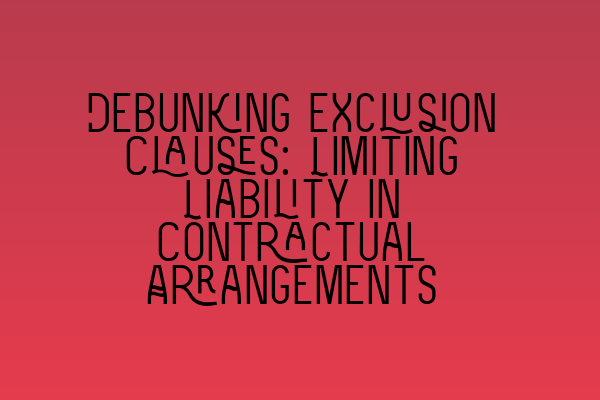Debunking Exclusion Clauses: Limiting Liability in Contractual Arrangements
When entering into a contract, it is essential to understand the potential risks and liabilities involved. To mitigate these risks, parties often turn to exclusion clauses, which aim to limit liability in case of a breach or failure to perform contractual obligations. However, the effectiveness and enforceability of exclusion clauses have been a subject of debate and contention in contract law. In this article, we will explore the intricacies of exclusion clauses and debunk common misconceptions surrounding their use.
The Purpose of Exclusion Clauses
Exclusion clauses serve as a means for parties to restrict or exclude their liability for certain types of loss or damage that may arise from the contract. They are typically included in contracts to protect the interests and resources of the parties involved. By including specific provisions, parties can allocate risks and responsibilities according to their needs and preferences.
However, it is crucial to note that exclusion clauses are subject to legal scrutiny and must meet certain requirements to be considered valid and enforceable. They cannot be used to exempt liability for intentional wrongdoings or illegal activities. Additionally, the courts tend to interpret exclusion clauses narrowly, so any ambiguity or uncertainty regarding their meaning might work against the party seeking to rely on them.
Common Misconceptions About Exclusion Clauses
1. “All exclusion clauses are ironclad and binding.”
This is a common misconception. While some exclusion clauses may be enforceable, their validity depends on several factors. Courts will examine the fairness and reasonableness of the clause, considering its wording, prominence, and overall context. If a clause is found to be unreasonable or contrary to public policy, it may be deemed unenforceable.
2. “Including an exclusion clause means I am free from all liability.”
Exclusion clauses cannot fully absolve a party from liability. Even if a clause is enforceable, it may only limit liability to a certain extent. The court will consider the wording and scope of the clause, as well as the nature of the breach or negligence, in determining the extent of liability that can be excluded.
Key Considerations for Drafting Exclusion Clauses
When drafting exclusion clauses, it is essential to ensure their enforceability and effectiveness. Here are some key considerations to keep in mind:
a. Clear and Unambiguous Language: Exclusion clauses must be drafted using clear and unambiguous language to leave no room for interpretation. Ambiguity may work against the party seeking to rely on the clause.
b. Reasonable and Fair Terms: The terms of the clause should be fair and reasonable to avoid potential challenges. Courts are more likely to invalidate clauses that are considered unfair or oppressive.
c. Conspicuousness: Exclusion clauses should be adequately brought to the attention of the other party. They should be presented in a manner that one would reasonably expect the other party to notice and understand.
d. Review by Legal Professionals: Seeking advice from legal professionals during the drafting process can help ensure that exclusion clauses meet the necessary legal requirements and are effectively tailored to the specific contract.
Conclusion
Exclusion clauses can be a valuable tool for parties to limit liability in contractual arrangements. However, their effectiveness and enforceability are not guaranteed. It is important to understand the legal requirements and considerations involved in drafting and relying on such clauses. Seeking professional legal advice and keeping up-to-date with the latest developments in contract law can help ensure that exclusion clauses serve their intended purpose.
For more information on contract law and the journey to becoming a solicitor, check out our related articles:
- Securing Training Contracts: A Roadmap to Becoming a Solicitor
- Mentorship for Aspiring Solicitors: Nurturing Talent in the Legal Field
- Legal Challenges and Pitfalls: Navigating the Complexities of the Legal System
- The GDL (Graduate Diploma in Law): A Pathway to Becoming a Solicitor
- Mastering the Solicitor’s Path: Prepare for the Journey Ahead
